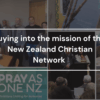ABC Religion and Ethics | 26 July, 2013
Hoisted on his own petard – that phrase has kept coming to mind as I’ve followed the announcement, explanation and implementation of the so-called “PNG Solution.”
In 2006, then-Shadow Minister for Foreign Affairs Kevin Rudd wrote an article for The Monthly entitled “Faith in Politics.” It was about the role of churches and individual Christians in politics. His purpose was to critique the “privatised, pietised and politically compliant Christianity” of the televangelists and to challenge “those who would seek today to traduce Christianity by turning it into the political handmaiden of the conservative political establishment.”
In this argument, Rudd nominated the important German theologian, church leader and martyr Dietrich Bonhoeffer as the proponent and exemplar of authentically Christian political engagement. “Bonhoeffer is, without doubt, the man I most admire in the history of the twentieth century,” he wrote, and I do not doubt him.
Rudd’s account of Bonhoeffer’s life, thought and ongoing relevance was informed and insightful. It still makes worthwhile reading. In particular, Rudd was able to crystallise a core principle to shape the engagement between Christians and the state – namely, “that Christianity, consistent with Bonhoeffer’s critique in the 30s, must always take the side of the marginalised, the vulnerable and the oppressed.” He went on to show how such a principle would guide Christians’ engagement with some specific political challenges. One example is worth quoting at length:
“Another great challenge of our age is asylum seekers. The biblical injunction to care for the stranger in our midst is clear. The parable of the Good Samaritan is but one of many which deal with the matter of how we should respond to a vulnerable stranger in our midst. That is why the government’s proposal to excise the Australian mainland from the entire Australian migration zone and to rely almost exclusively on the so-called Pacific Solution should be the cause of great ethical concern to all the Christian churches. We should never forget that the reason we have a UN convention on the protection of refugees is in large part because of the horror of the Holocaust, when the West (including Australia) turned its back on the Jewish people of Germany and the other occupied countries of Europe who sought asylum during the ’30s.”
But now Kevin Rudd is the Prime Minister in a government that has itself excised the Australian mainland from the Australian migration zone and adopted its very own “PNG Solution.” He leads a government whose policy on asylum seekers is inevitably “the cause of great ethical concern to all the Christian churches.”
Even if the so-called PNG Solution “worked” and refugees fleeing for their lives stopped arriving by boat in Australian waters seeking asylum, the “solution” is wrong. It is wrong morally and spiritually. It is wrong because it requires us to mistreat and harm a group of marginalised, vulnerable, oppressed people who have arrived asking us for help.
It also a poor way to treat those who have not yet taken to the boats. There is nothing wrong with wanting to give desperate people in war torn countries a better option than risking ocean voyages in crowded, inadequate vessels – quite the contrary. But the PNG Solution does not do that. It merely tries to remove the last – admittedly bad – option they have left.
In his 2006 essay, Rudd reflected on how Bonhoeffer might have responded to complex contemporary issues such as “militant Islamism,” “international terrorism” and asylum seekers. He wrote, “Bonhoeffer’s voice, speaking to us through the ages, would ask this simple, truth-based question: what is causing this phenomenon? He would also caution against inflammatory rhetoric that seeks to gain political advantage, rather than respond substantively and find a way forward.”
So what is causing this phenomenon? More to the point, why isn’t the political debate about those causes – war, poverty, racism – and how Australia can best involve itself in international efforts to address them?
Conveying the truth over the lies in this political maelstrom has become one of the most complicated challenges for us as Christians. With both major political parties – each led by a practicing Christian – trumpeting policies with language such as “waves of boats”, “flood of migrants,” “orderly migration” and “sovereign borders,” it is difficult to remember that at the heart of this “wicked problem” are the extraordinary lives of very ordinary men, women and children seeking asylum.
The uncomplicated truth – indeed, the unheard truth – is this: Our borders are not under threat. It is not illegal to seek asylum. There is no such thing as an orderly queue. We are not being overrun by asylum seekers on leaky boats. There is no “refugee emergency” or “crisis” in Australia. The reality is around 45 million people worldwide are displaced because of conflict, famine and persecution. This is the truth that Prime Minister Rudd has turned his back on and that Opposition Leader Tony Abbott wilfully disregards in this awful debate. In their desire to secure more votes in the upcoming election, Labor and the Coalition are engaging in what must be one of the hardest and most retributory round of policies we have seen in this country since the White Australia program.
Under Labor’s latest scheme, all asylum seekers arriving by boat will now be processed in offshore detention centres – most likely Nauru and Manus Island. Those whose applications are successful – and we know that just over 90% of those who arrive by boat are confirmed as refugees – will not be resettled in Australia. Instead, they will remain in Papua New Guinea, a nation with entrenched poverty, high levels of violent crime, poor healthcare and education and high unemployment.
Of course, this isn’t just about the utter inadequacy of a developing nation to provide a safe and secure future for a miniscule number of the world’s refugees. This is also about the fundamental abrogation of our commitment to human rights here in Australia. There are around 17,000 asylum seekers and refugees living in poverty in Australian communities who have been denied the right to work. There are a further 10,000 asylum seekers in detention centres, including 1700 children.
In 2006, Kevin Rudd was right about the clear implication of the biblical injunction to care for the stranger in our midst. He was right to draw lessons from the Good Samaritan to guide our response to the vulnerable stranger. He could have added the command of Jesus to treat others as you would want to be treated. He could have pointed to the Christian conviction that every human being is made in the image of God; that they have a dignity and significance as human beings that commands our respect and care, and that requires that we do not harm them. It requires that we honour them, extend hospitality to them and, indeed, love them. And against all these measures, his PNG Solution is just wrong. Indeed, against Kevin Rudd’s own measures of right and wrong, his PNG Solution is just wrong.
What would Bonhoeffer do about asylum seekers, Mr Rudd? You know as well as I do that it wouldn’t be this.
Andrew Dutney is the President of the National Assembly of the Uniting Church in Australia, and teaches Systematic Theology at Flinders University.









0 Comments